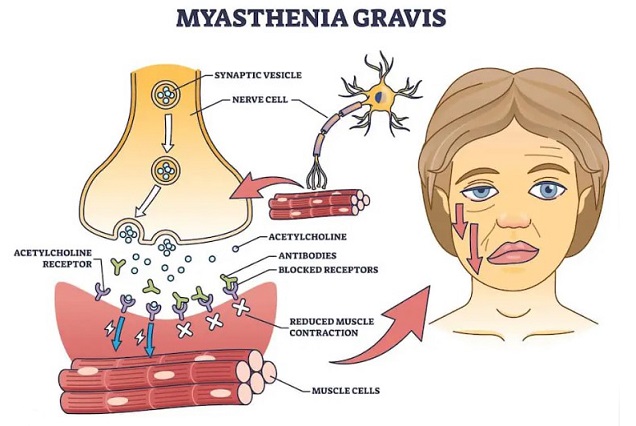Nikhil Prasad Fact checked by:Thailand Medical News Team Oct 16, 2024 1 year, 2 months, 1 week, 6 days, 2 hours, 19 minutes ago
Medical News: Researchers at Nova Southeastern University in Florida-USA have recently reported a fascinating case that highlights a rare neurological complication following COVID-19 infection. This case study, published in a peer-reviewed journal, explores the onset of a neuromuscular disease in an 81-year-old man, months after he recovered from COVID-19. This
Medical News report delves into the case study and its implications, shedding light on the possible long-term effects of the virus on the immune system.
 COVID-19 can cause Myasthenia Gravis in the elderly
Background on Myasthenia Gravis (MG)
COVID-19 can cause Myasthenia Gravis in the elderly
Background on Myasthenia Gravis (MG)
Myasthenia gravis (MG) is a rare autoimmune disorder that affects the communication between nerves and muscles, leading to muscle weakness. It occurs when the body’s immune system mistakenly attacks receptors in the muscles that respond to nerve signals, specifically targeting acetylcholine receptors (AChR). Symptoms can range from difficulty with eye movement and swallowing to severe respiratory issues. MG can be classified into three categories based on age: early-onset (under 50), late-onset (ages 50-64), and very-late-onset (65 and older). In this article, researchers presented a unique case of very-late-onset MG, triggered months after a COVID-19 infection.
Case Presentation
The subject of the study was an 81-year-old man with a medical history including hypertension, obstructive sleep apnea, hypercholesterolemia, ischemic cardiomyopathy, and prostate cancer in remission. About four months prior to his hospitalization for myasthenia gravis, he had contracted COVID-19 and was treated with standard therapies like remdesivir and corticosteroids. His recovery from the COVID-19 pneumonia was uneventful at that time. However, four months later, he began to experience symptoms such as difficulty speaking (dysarthria), shortness of breath, and difficulty swallowing (oropharyngeal dysphagia), which were progressively worsening.
Upon admission to the hospital, he reported severe shortness of breath and double vision (diplopia). Given his age and the unusual delay in the onset of symptoms, this case raised significant interest among medical professionals. This article highlights the fact that the patient’s diagnosis came after a much longer period compared to other similar cases of post-COVID MG, where symptoms usually appear within four to eight weeks following infection. The Centers for Disease Control and Prevention (CDC) and the World Health Organization (WHO) recognize cases like these as “Post-COVID Condition” or “Long COVID.”
The Link Between COVID-19 and Myasthenia Gravis
The connection between viral infections and autoimmune disorders is well-documented. It is believed that COVID-19, like many other viral infections, can disrupt the immune system's function and trigger autoimmune responses in vulnerable individuals. In this case, the patient’s immune system produced autoantibodies that attacked the AChR receptors, disrupting the normal function of muscle control. What makes this case particula
rly interesting is the delayed onset of symptoms and the patient’s age, placing him in the very-late-onset category of MG.
Laboratory tests confirmed the presence of AChR antibodies in the patient, which is a hallmark indicator of MG. Following his diagnosis, the patient was treated with pyridostigmine (a medication that improves communication between nerves and muscles), intravenous immunoglobulin (IVIG) therapy, and a high-dose pulse of methylprednisolone. His condition improved following these treatments, and he was later discharged, showing no signs of MG during a follow-up 12 months later.
Study Findings and Clinical Significance
The study emphasizes the importance of recognizing the potential link between COVID-19 and new-onset autoimmune disorders, even in patients who initially recover from the virus without significant complications. The patient in this case had a delayed onset of MG symptoms, which is not commonly seen in other post-COVID neurological cases.
The pathophysiology connecting COVID-19 to MG is thought to involve immune dysregulation. The virus may disrupt immune tolerance, triggering autoimmunity in some individuals. The study findings suggest that post-viral autoimmunity might be an under-recognized complication of COVID-19, particularly in elderly patients. This has important implications for how we monitor and treat patients who have recovered from COVID-19, especially those with lingering or new symptoms that might indicate an autoimmune response.
Conclusion
The study concluded that COVID-19, like other viral infections, can be a trigger for autoimmune diseases such as MG, especially in older patients. The fact that this patient’s MG symptoms emerged four months after recovering from COVID-19 suggests that the long-term effects of the virus on the immune system are still not fully understood. The researchers stress the need for continued vigilance in diagnosing and managing post-COVID complications, particularly neurological conditions, in elderly and vulnerable populations.
In this case, timely intervention and treatment helped the patient recover from what could have been a life-threatening condition. The findings of this study highlight the importance of understanding post-viral autoimmune responses and the potential for delayed onset of symptoms, even in patients who appear to have recovered from COVID-19.
The study findings were published in the peer-reviewed journal: Cureus.
https://www.cureus.com/articles/280479-complications-of-long-covid-unraveling-a-case-of-very-late-onset-myasthenia-gravis#!/
For the latest COVID-19 News, keep on logging to Thailand
Medical News.
Read Also:
https://www.thailandmedical.news/news/breaking-covid-19-news-italian-researchers-report-that-sars-cov-2-can-trigger-myasthenia-gravis,-a-neuromuscular-disease
https://www.thailandmedical.news/news/breaking-news-covid-19-latest-study-uncovers-a-variety-of-neuromuscular-disorders-associated-with-covid-19
